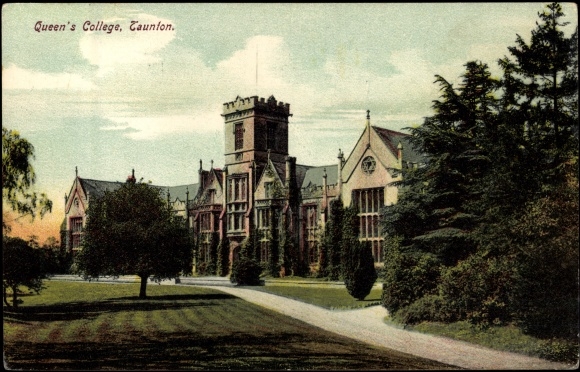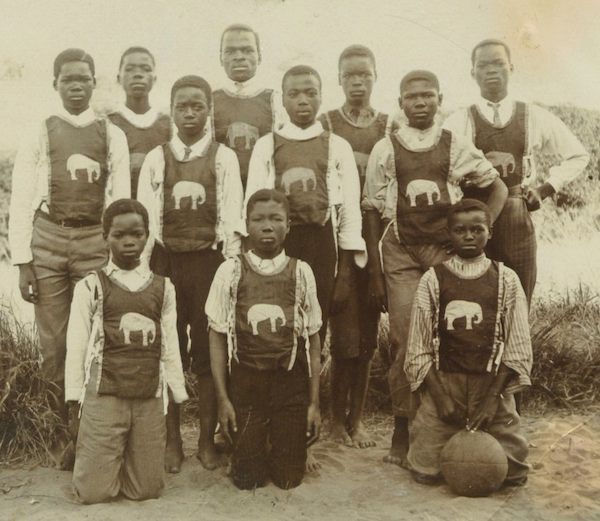
The football skills of Richard W. Msimang, a prominent early member of the now 100-year-old African National Congress in South Africa, were reportedly as sharp as his legal mind and political acumen. Last year on this blog I posted a portion of an article published in a 1913 issue of the ANC’s newspaper Abantu Batho (given to me by Peter Limb) that provided a glimpse into Msimang’s sporting past as a student in South Africa and Britain.
Born in Edendale, a freehold black area on the outskirts of Pietermaritzburg, KwaZulu-Natal, a community with a well-deserved reputation for defiance of colonial authority, Richard and his brothers Selby and Herbert grew up refusing to be black servants of white masters. Sport, formal education, and political activism channeled the enlightened self-interest of the Msimangs much like they informed the 20th-century South African struggle for political and cultural empowerment. Thanks to the kindness and generosity of Geoff Bisson (Queen’s College, Taunton), Brian Willan (Rhodes University), and once again Peter Limb, I can now share additional evidence of Richard Msimang’s prowess on the football and rugby pitch.
 The revealing passage below focuses on Msimang’s time at Queen’s College, Taunton (see postcard), a boarding school in the West of England. In his book History of Queen’s College, Taunton (Taunton, England: Old Queenians’ Association, 1957; p. 157), H. J. Channon writes:
The revealing passage below focuses on Msimang’s time at Queen’s College, Taunton (see postcard), a boarding school in the West of England. In his book History of Queen’s College, Taunton (Taunton, England: Old Queenians’ Association, 1957; p. 157), H. J. Channon writes:
On a cold, wet afternoon in November, 1904, a few of us were practising shooting at goal on the Lower. We noticed a dark figure, in a bowler hat and a heavy black overcoat, standing on the terrace watching us. It was the first day at Queen’s of a Zulu, R. W. ‘Msimang. He passed through the gap on to the field. The soccer ball was thrown to him, and he could not resist the temptation of racing towards it. Unfortunately for him the ball stopped just in front of a deep pool. Through the water ‘Oomsi dashed, slipped and sat down, with his bowler floating away from him. We took him up to the Linen Room for a complete change of clothes. His charming smile we saw for the first time it never seemed to desert him. In his own country he had played a lot of soccer, but on the hard grounds he had never worn boots. It was not long before he was in the first XI, and at first when the ground was hard he dispensed, with football boots. I can see him now dashing down the left wing to the corner flag and middling the ball with perfect accuracy. After several years he was articled to a Taunton solicitor, but continued to live at the school. He took up rugby, and became the most popular player Taunton has ever had. The crowd loved to see him emerge with a smile from the bottom of a heap of forwards. He was a brilliant scrum-half [fly half according to Willan], tough and with a swerve that made it difficult to bring him down. So popular was he, that sometimes he had to leave the ground by a back exit to avoid the crowd. After he had passed his final law examination he returned to South Africa, where he became a State Attorney under the Transvaal Government.
Tag: R. W. Msimang

While putting together a post on Gaddafi and football, I received a poignant reminder of the century-long history of African political leaders’ involvement in the game. Richard W. Msimang, a founder of the African National Congress in South Africa, played football in school in South Africa and in Britain — where he lived for a decade — and then in 1929 was a founder of one of Johannesburg’s leading black football associations. A July 1913 newspaper article celebrating Msimang’s admission as an Attorney of the Supreme Court of South Africa includes the following passage:
Those who have met and seen Mr. Msimang have noticed what a remarkable popular and genial personality he bears. We learn that from boyhood at Emakosini, and at Mr. Dube’s School and Healdtown, in or out of school, he was always popular and well liked by all the boys who knew him. Even at Queen’s College [in Britain] he was very popular and respected by the boys with whom he studied or played.
In the sphere of games he was equally as successful as in education. At Ohlange he played for the 1st XI, and also at Healdtown he was a member of the “Healdtown Swallows” Eleven. At his first football season in England, he got his place in the School first Eleven outside left, where he played with great distinction until he left the school to start his professional training. He then played Rugby football when, during his first season on the new code, he got a place at outside-half in the 1st XV of the Taunton Rugby Football Club, and played continuously for the club. During his last season he was Vice-Captain of the team. The Taunton Rugby Club is one of the first class Rugby teams in the West of England and it is interesting to note that our new lawyer, whether playing for the school or the town team, was always the only man of colour in the game. Again the Taunton Rugby Club appreciated Mr. Msimang’s service so much that when leaving Taunton for his homeland the Club presented him with a gold watch chain and pendant inscribed in commemoration of his association with the Club. Mr. Msimang has now no intention to play football again.
Source: “The New Solicitor: Mr. R. W. Msimang”, Abantu Batho 3? July 1913 [reprinted in Tsala ea Batho 5 July 1913]. My thanks to Peter Limb for bringing this article to my attention.
Further reading: Laduma! and African Soccerscapes